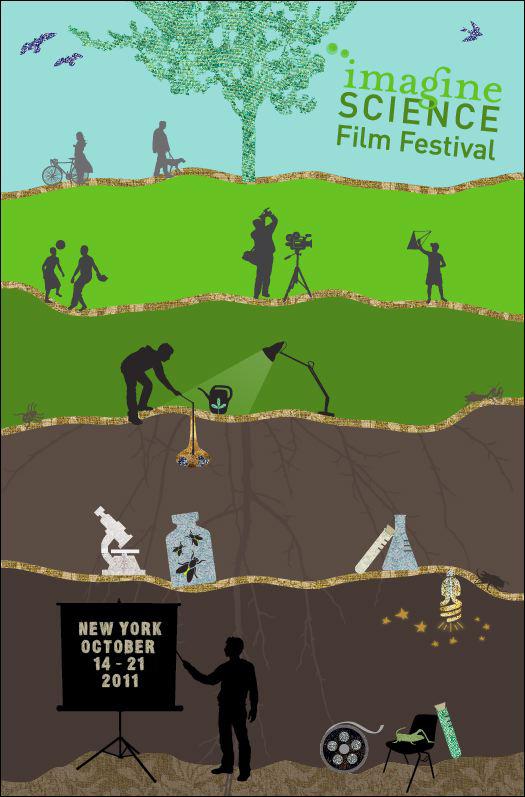Imagine Science Film Festival
Alexis Gambis, whose work as a genetics researcher earned him a PhD at Rockefeller University, has been interested in films for as long as he’s been interested in science. But when it came to movies about science, Gambis was frustrated with dry documentaries and fantastical science fiction — there seemed to be very little in between.
For Gambis, discoveries and data aren’t the only interesting aspects of science. The pursuit of scientific breakthroughs can draw a perfect narrative arc — whether the climax is success or failure — and the stakes are high: greater human understanding of the world we live in.
Gambis began programming a film series of his favorite science-themed films for his fellow students at Rockefeller. The series eventually evolved into the first and only full-fledged film festival dedicated to science films in the U.S. This year, the fourth Imagine Science Film Festival (ISFF) will be held in New York City October 14-21. Venues in Manhattan, Brooklyn, and Queens will host 80 films from 15 countries.
Chosen from roughly 400 submissions, the films selected take the form of documentaries, experimental shorts, music videos, animated pieces, and works of fiction. They are diverse in style and subject, but the selection committee clearly placed a high value on striking visuals. The films may not have been created for wide commercial distribution, but nothing about them feels amateur.
Gambis and the ISFF staff are working to actively support new filmmakers with a number of grants and awards, including their new Film Lab initiative, which provides grants for filmmakers to spend a month observing in a scientific lab as part of research and development of a new film.
The Festival kicks off at the Museum of the Moving Image with the sci-fi drama Mr. Nobody, starring Jared Leto and Diane Kruger, about memory and mortality in a future marked by indefinite lifespans. As the last living mortal in the year 2092, 117-year-old Nemo Nobody (Leto) attempts to recount his life to a reporter, struggling to recreate the narrative from his failing memory. Following the screening, researchers will join the filmmakers to discuss the science behind the phenomena portrayed in the film.
But even more promising is the opportunity to see a variety of shorts. These films are programmed by themes, including “Reaching Space,” “Genetic Attraction,” and “Time Sensitive.” The “Controlled Experiments” evening of films will feature Markus Kayser’s short Solar Sinter Project. It follows his experiments in the Sahara, exploring the possibilities of using the desert resources of sand and sun to produce glass objects with 3D printing technology.
Video: Solar Sinter Project
Solar Sinter Project will be screened along with 20 other short films on October 17 at The Bell House in Brooklyn.
Check out the film lineup and trailers and buy tickets.
Every day, reporters and producers at The World are hard at work bringing you human-centered news from across the globe. But we can’t do it without you. We need your support to ensure we can continue this work for another year.
Make a gift today, and you’ll help us unlock a matching gift of $67,000!
